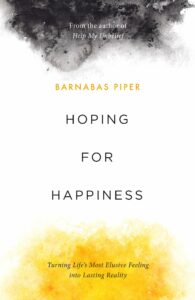
“The words of the Preacher, the son of David, king in Jerusalem. Vanity of vanities, says the Preacher, vanity of vanities! All is vanity.” (1:1)
These opening words of Ecclesiastes certainly don’t seem like a very promising beginning for this so-called paradigm for human happiness. Quite the opposite, actually. It feels more like a warning of woe than a promise of bliss. And in a sense it is.
These opening words function a bit like a “road closed” sign. They tell us to reconsider our direction and to take another way. There is an implied “or else” in these words: You’ve been pursuing happiness in the wrong way, running after fulfillment in the wrong things. Seek happiness in a different way or else… Solomon knew the human heart and our proclivity for replacing things of eternal value with things of temporal enjoyment. After all, he was the king bestowed with supernatural wisdom who still wandered away from the Lord after sex and political alliances and riches. This, he says, is vanity—a vapor.
A warning is where most of us need to start. We are so single-mindedly devoted to pursuing happiness in directions which won’t last that the only way to snap us out of our tunnel vision is for the Preacher to rhetorically grab us by the collar and give a hearty shake. We need our foolish expectations and false hopes set straight. So the Preacher wipes them away in a sentence (and then over and over again throughout the book), not to leave us hopeless but to reconstruct happiness in a manner that reflects the realities of mortal, broken earthly life and eternal, joyful life with God. What Ecclesiastes declares is not, Happiness is unattainable, but rather, Happiness is attainable only if understood and pursued rightly. Then it shows us how to (and not to) understand and pursue it.
View all Things in Light of Eternity
An inescapable theme of Ecclesiastes is that of mortality. We see this in the Preacher’s repeated use (26 times in only 12 chapters) of the term “under the sun,” a statement of duration, not geography. Just as the sun has always been used to measure times and seasons, here is being used to define our lifespan. Eventually our day will come to an end; our time under the sun will cease. In fact, everything comes to an end eventually. That is what the Preacher means when he calls all things “vanity.” It’s not that they’re meaningless or valueless, but that they will not last. From the get-go, the Preacher reframes our perspective to see all of life in light of death.
If this strikes you as uncomfortably morbid, that is precisely why Ecclesiastes is written this way. We hate facing the reality of death. We hate its certainty and its finality. We hate how it robs us of joys. But we cannot escape it, so we must face it. Time and again, Ecclesiastes reflects the bleakness and grief of loss: “How the wise dies just like the fool!” (1:16); “All go to one place. All are from the dust, and to dust all return” (3:20); “This is an evil in all that is done under the sun, that the same event happens to all” (9:3).
Yet we’re mistaken if we take the message of Ecclesiastes to be, Well, this life is all there is so enjoy it while you can because nothing else really matters. In fact, Ecclesiastes points an entirely different and better direction. Death, as Ecclesiastes makes clear, puts a necessary limitation on us so that, if we are paying attention, we don’t make eternal idols out of temporal experiences. And for followers of Jesus, death is not the end of happiness. In fact, it is the end of suffering and pain, and an entry into the presence of the Lord at whose right hand are pleasures forevermore. So rather than thinking of death as the thief of joy we are corrected to think of life in light of this invitation to perfect joy.
Value Things for what God Created them to Be
As you read Ecclesiastes and begin to see life in light of eternity, another shift begins to take place. The pieces of life we put our hopes in most often—relationships, work, wealth, health, etc—come into clearer focus. Some of them, those we have made too much of, recede to a place of less prominence. Others, those we have overlooked and been unappreciative of, begin to take on places of greater and more appropriate value.
God created innumerable good gifts and blessings for us, but we fail to enjoy them as we ought because we have placed far too much or far too little value on them. By attending to life with eternity in mind we are able to see and value them as God intends. We see this in Ecclesiastes 5:18 and 9:9:
“Behold, what I have seen to be good and fitting is to eat and drink and find enjoyment in all the toil with which one toils under the sun the few days of his life that God has given him, for this is his lot.”
“Enjoy life with the wife whom you love, all the days of your vain life that he has given you under the sun, because that is your portion in life and in your toil at which you toil under the sun.”
The same is true for circumstances of a negative sort too. Life is full of suffering and loss, and we are often overwhelmed by it to the point of despair. If we encounter suffering in light of eternity, though, we see it as God intended. It does not become less painful, but it does become less powerful—a “light and momentary affliction” as Paul writes in 2 Corinthians 4:17.
Fear the Lord and be Grateful
Ecclesiastes ends with these words:
“The end of the matter; all has been heard. Fear God and keep his commandments, for this is the whole duty of man. For God will bring every deed into judgment, with every secret thing, whether good or evil.”
After twelve chapters of complexity and exhortation and reflection the Preacher boils the conclusion down to this: “Fear God and keep his commandments.”
In doing this, we will arrive at the genuine happiness. Consider, for example, God’s commands to rejoice and be thankful:
Rejoice in the Lord always; again I will say, rejoice. (Philippians 4:4)
Give thanks to the LORD, for he is good. (Psalm 107:1)
So to be grateful is to obey God’s commands—and to act in a manner worthy of a Holy God. What is more, fearing the Lord actually moves us into gratitude, because it acknowledges his rightful, holy place above all of life and all of time—and how little we’re entitled to and yet how much we have. By fearing we become grateful, by being grateful we obey God’s commands, and in both we find happiness.
Indeed, fearing the Lord is the lens through which to view the whole of Ecclesiastes. It is the tone, the foundation, and the outcome of the entire book. To view life with eternity in mind is to fear the Lord, because it acknowledges his infinity and the beauty of eternal life with him. To have right expectations is to fear the Lord, because it submits to his standards rather than creating our own. It also fuels our gratitude because we are able to enjoy life in the manner he intended with an eye toward the life he promises to all who follow him. These closing words of Ecclesiastes are rich with the promise of happiness.
Happiness Defined
What Ecclesiastes leaves a careful reader with is not a sense of ecstasy or bliss. It is not a book of excitement or thrills or giddiness. There are not even any of the “pinnacle passages” like you find elsewhere in Scripture. Ecclesiastes spends more time talking about unhappiness than happiness. And yet I find this little book to be foundational for human happiness. It does not take to the pinnacle of happiness; it sets a baseline. It is not a how-to book; it sets boundaries. It does not give ingenious strategies; it sets the rules. So if you haven’t read Ecclesiastes in a while, or maybe not ever, why not pick it up and give it a try?
Most people go through life looking for peak happiness, always seeking to increase the sensation and up the experience. Ecclesiastes wants no part in that and warns against it. Rather it defines happiness in a manner that is realistic and accessible. It offers a grounded version of happiness that can be held on to throughout the difficulties of life.
This side of heaven, what else can we ask for? In fact, we’ve already asked for it. We’ve sought it. We’ve chased it. And we’ve come up empty. Happiness is life’s most elusive feeling. But we’ve seen that it can become both a present and a lasting reality.
 This is an excerpt from my book Hoping for Happiness.
This is an excerpt from my book Hoping for Happiness.
